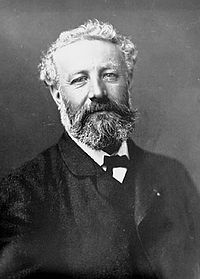Throughout the course of human history, only a few authors will be graced with the recognition of their contribution to man’s vast literary tradition as a groundbreaking shift in storytelling. One of them, Jules Verne, was born on February 8, 1828 in the French coastal city of Nantes. His most famous stories, published in the latter half of the 19th century, took readers on a journey into the future long before much of the technology he wrote about existed. Verne’s family benefited greatly from his father’s success as an attorney in Nantes. Summers in the country allowed the young boy’s mind to run wild, particularly as he and his brother watched large ships sail down the Loire River. The sense of wonderment at the possibility of traveling the world affected him greatly, inspiring his writing throughout his life — and affecting his grades during school. After graduation, he moved to Paris to further his education and follow his father into the law profession. While there, he split his time between studying and writing, drafting lyrics for operettas written by a friend and submitting fanciful short stories to the Musee des Familes magazine. His penchant for creating vivid imagery of far-off lands, demonstrating his keen sense of the fine details it took to draw a reader into a foreign — and often out-of-this-world — setting. When his father discovered Verne had been writing instead of learning statues and court decisions, he stopped backing his son’s life in the French capital. Verne was forced to work as a stockbroker in order to make ends meet, living somewhat comfortably despite an intense distaste for the industry. Encouraged to seek a publisher by his wife — and, perhaps, taking cues from conversations with successful authors Victor Hugo and Alexandre Dumas — Verne continued to hone his style, earning a contract for publication in Sweden for Five Weeks in a Balloon in 1863. Around the same time, he connected with Pierre-Jules Hetzel, an influential publisher with a list of luminary authors under his direction. Though he appreciated Verne’s talent immediately, Hetzel worked diligently to help the aspiring writer formulate more appealing storylines and relatable characters. The partnership blossomed, lasting until Hetzel’s death in 1886. Armed with a more complete sense of what people wished to read and shaped by Hetzel’s eye for a popular story, Verne published Journey to the Center of the Earth in 1864, the first of his popular works. He followed that with From the Earth to the Moon the next year and Twenty Thousand Leagues Under the Sea in 1869. By the time Around the World in Eighty Days was serialized in Hetzel’s magazine three years later, Verne was a bona fide success. Financially supported by his writings, Verne’s wealth multiplied after he began working with theater companies to adapt his stories for the stage. With his place in French cultural history secure after less than a decade as a published author, he received induction into the Legion d’honneur as Chevalier in 1870. He moved into politics later in life, serving as a town councillor for his home of Amiens from 1888 until 1903. Suffering from the affects of diabetes, he died at his home on March 24, 1905. A century and a half after his first stories were published, Verne casts a wide shadow over the genre of science fiction. His seminal works, such as From the Earth to the Moon, spoke of technologies far in advance of anything his society could have believed possible. Indeed, many of the features in his stories would not even become plausible for decades. In 1989, Verne’s great-grandson opened an old safe and discovered Paris in the Twentieth Century, the only story completely rejected by Hetzel. Describing a young man unable to find happiness, the story features high-rise buildings, gas-powered cars, calculators and technology capable of allowing people to speak to each other despite being half a world away — a prescient vision of the modern world. Also On This Day: 1587 – Mary, Queen of Scots, is executed for her suspected role in the Babington Plot to kill Queen Elizabeth I 1879 – Universal Standard Time is proposed to replace Greenwich Mean Time by Sandford Fleming at the Royal Canadian Institute 1904 – A surprise Japanese torpedo attack at Port Arthur, China begins the Russo-Japanese War 1960 – The first eight brass star plaques are installed on the Hollywood Walk of Fame You may also like : February 8 1904 – A surprise Japanese torpedo attack at Port Arthur, China begins the Russo-Japanese War
February 8 1828 – Jules Verne is Born in Nantes
Throughout the course of human history, only a few authors will be graced with the recognition of their contribution to man’s vast literary tradition as a groundbreaking shift in storytelling.…
464
